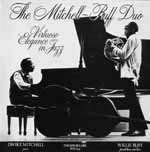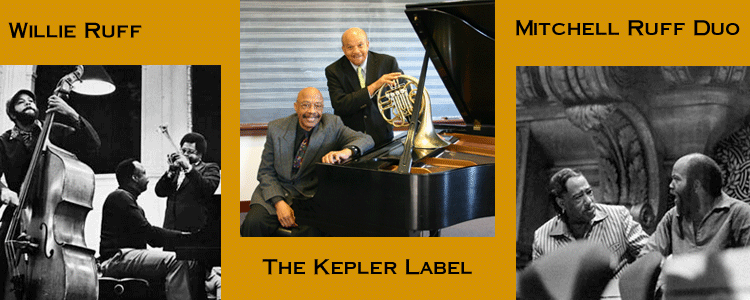 Virtuose Elegance in Jazz
Virtuose Elegance in Jazz
Reprinted with permission of The Wall Street Journal,
Friday, August 17, 1984
Leisure and Arts
The Jazzmen Wailed and Everyone Cried
By EDWIN WILSON
New York
Every year hundreds of new books are launched by New York publishers. Frequently this takes the form of a cocktail party. On one table, the obligatory white wine will be served, and on another, cheese and stalks of broccoli and cauliflower surround a pale-green dip. The editor praises the author; the author praises the editor; and after a brief period of chitchat, the group disperses.
A recent publisher's party I attended began like all the rest. Held on the 11th floor at the Harper and Row offices, its purpose was to introduce "Willie and Dwike" by William Zinsser. A company official delivered a few perfunctory and self-congratulatory remarks, and then introduced Mr. Zinsser. The subjects of Mr. Zinsser's book are two black musicians, Willie Ruff and Dwike Mitchell, who have played together as a jazz duo for nearly 30 years. Both men were present, and after talking briefly about the book Mr. Zinsser said that they would play for us, explaining that they had played the night before with the Boston Pops orchestra.
Mr. Ruff, who is a professor of music at the Yale Music School, went to a canvas case and pulled out his French horn, an unusual instrument for jazz. Mr. Mitchell, who ordinarily plays a concert grand Baldwin, sat down at an upright Yamaha.
Mr. Ruff announced that they would begin by playing "St. Louis Blues." It was an appropriate choice because the song's composer, W.C. Handy, was born in a log cabin only a few miles from where Mr. Ruff himself was born in northern Alabama. Mr. Mitchell began a tango rhythm, and the two played an inventive and evocative version of the famous blues. After a few phrases, everyone stopped eating and drinking, and sat on the carpet to listen.
Next, Mr. Ruff said that they would play Billy Strayhorn's "Lush Life," a quiet, sensual number whose serenity was counterpointed by sharp cracks of thunder from a summer storm outside. Following that they played "Lazy Afternoon," and John Hammond, the dean of jazz record producers who was sitting along a side wall, wrinkled his face into a broad smile as first Mr. Ruff and then Mr. Mitchell improvised around the familiar tune.
For their finale the two men played a medley from "Porgy and Bess." When they reached "I Love You, Porgy," I felt my eyes fill with tears. The lyrical beauty of Gershwin's melody, the resonance and purity of Mr. Ruff's French horn and the delicate, mystical quality of Mr. Mitchell's piano affected me in a way I was not prepared for.
When they finished playing, I discovered that almost everyone present had been affected in the same way. The publishing official, who previously had spoken perfunctorily stood to thank the musicians but his voice broke and he said simply that he could not remember when he'd last been moved in this way. People were astonished not only that they had been deeply touched but that it had happened so quickly and in so unlikely and unpromising a place.
The one person who was not surprised was the author, Mr. Zinsser. Since he first met Messrs. Ruff and Mitchell at Yale in 1973, Mr. Zinsser has followed their careers and traveled with them on a number of their tours. Wherever he saw them play - for homefolks in Muscle Shoals, Ala., for employees at the John Deere headquarters outside Moline, Ill., or for a group of restrained, bewildered music students at the Shanghai Conservatory in China - Mr. Zinsser observed their uncanny ability to communicate with audiences.
One reason is their superb musicianship, another is their incredible rapport with each other, and still another is that they are both born teachers. Mr. Ruff always does the talking, and in order to reach foreign audiences he has become a first-class linguist. In 1959, the Ruff-Mitchell duo played in the Soviet Union and Mr. Ruff taught himself Russian. He is now fluent in eight languages, the most recent being Mandarin Chinese, which he learned for their trip to Shanghai in 1981.
In "Willie and Dwike" Mr. Zinsser chronicles the trips and the lives of these two remarkable men. He does so in a clear spare prose that is as good as any reportage being written today. Mr. Zinsser obviously admires his subjects and has a sense of wonder at the way they have combined lowbrow and highbrow, stern intellectual discipline with joyful emotion, and humble origins with astonishing achievements.
Though temperamentally quite different, the two men have much in common. Both were born into poor families in the South, Mr. Mitchell in Florida and Mr. Ruff in Alabama; both came from broken homes and suffered their share of prejudice and poverty. They also showed prodigious musical talent that led them both by circuitous routes to Lockbourne Air Froce Base outside Columbus, Ohio in 1947.
Following World War II, military installations were still segregated and returning black heroes found themselves unable to visit such places as officers' clubs. The embarrassed War Department solved the problem by establishing Lockbourne as an elite black base. It was distinguished by having more college graduates per capita than any base in the country and the best music program, with a 160-piece orchestra and two jazz bands. The older musicians at Lockbourne taught the younger, and that's where both Mr. Ruff and Mr. Mitchell got their start.
After Lockbourne they separated, with Mr. Ruff going to Yale to study with Paul Hindemith and Mr. Mitchell moving to Philadelphia to study classical piano at the Musical Academy. In 1954 Mr. Mitchell was playing with Lionel Hampton's orchestra when Mr. Ruff saw him on television and got in touch with him. The two have been playing together ever since.
The subtitle of Mr. Zinsser's book is "An American Profile" and it is appropriate because Messrs. Ruff and Mitchell's story is uniquely American. Throughout their early careers both men were befriended by a series of teachers, many of them white, who took a keen interest in their careers. They, in turn, have taught literally thousands of others in private classes, at colleges and universities and on concert tours. Now thanks to Mr. Zinsser's book, the rest of us have a chance to learn from them too.
